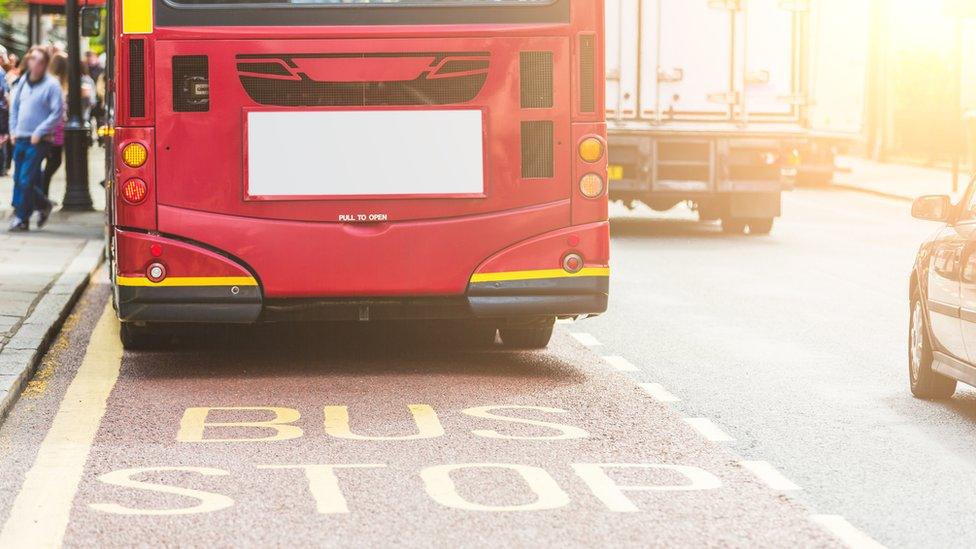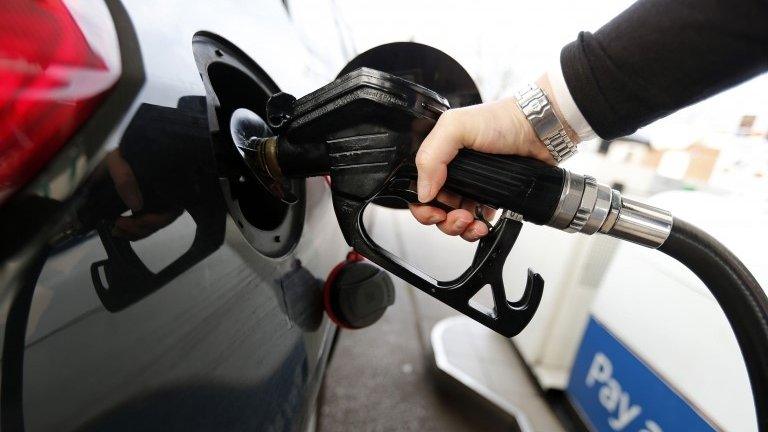Bus use falls across two-thirds of English councils
- Published

Bus use has fallen across most of England
The number of bus passenger journeys has fallen in two-thirds of English council areas over the past six years, prompting concern over funding cuts and fare hikes.
BBC News found that out of 89 transport authority areas, just 29 reported a rise in the number of passenger trips.
Campaigners blamed government cuts and said there was a "danger of whole networks of bus services being lost".
The government said it was investing £250m into bus services this year.
The biggest percentage drop was in Redcar and Cleveland where figures showed 27% fewer bus journeys made in 2014-15 compared with 2009-10.
It meant numbers were down from 5.7 to 4.1 million journeys, according to official Department for Transport figures.
However, the figures reveal vast differences across the country. West Berkshire has recorded a 44% rise in bus journeys over the same period while Poole saw a 39% increase and North Somerset a 30% rise. London's bus use has also risen by just under 6%.
Councillor Dale Quigley, Redcar and Cleveland's cabinet member for economic growth, said: "Whilst the council does work closely with local bus provider Arriva to provide services that will hopefully benefit communities it must be acknowledged that, beyond London, the deregulation of the bus industry has not served our communities well. The lack of ability to control fares or plan a coherent network of routes means commuters are not getting the best service possible.
"We are working closely with other local authorities across the Tees Valley to improve the bus journey experience through improving bus stop and bus station facilities to make public transport more attractive to the public.
"Devolution and new powers to regulate buses will enable local transport authorities and partnerships between them to plan a coherent local transport network. However, to make a reality of regional transport strategies, it is essential that more of the funding for investment is also devolved."
Meanwhile, bus fares have continued to rise.
In the West Midlands, bus company National Express imposed a 10p price hike on a single adult fare at the start of January, when figures showed diesel prices were at a six-year low.
Bus journeys across Birmingham, the Black Country, Coventry and Solihull have fallen from 294 million journeys in 2010-11 to 275 million in 2014-15, while the fare has gone from £1.80 to £2.30.
A National Express West Midlands spokeswoman said a quarter of passengers, such as those using smartcards or family daysaver tickets had seen their fares frozen, while the company was also investing £4m in new buses.
"Fuel makes up a fairly small percentage of National Express' costs," she said.
She said the largest cost came from wages, and the company was proud to have recently become a Living Wage employer.
The spokeswoman added: "Like many companies, National Express buys its fuel a long time in advance. This enables us to plan ahead, smooth out costs and not be affected by every price fluctuation at the pumps."
The company said cheaper petrol, online shopping and the decline of the high street may have contributed to the decline.
Subsidies for bus services were cut following the 2010 Spending Review, prompting 70% of councils to reduce funding for services, while many operators increased fares.
Martin Abrams, from the Campaign for Better Transport, said: "Across the country, we are seeing a very worrying trend of declining bus usage, a decline which correlates with the huge funding cuts to local authority supported buses we've seen over recent years.
"We really are in danger of seeing whole networks of bus services being lost. Buses play a crucial role in helping people to access jobs, shops, education and are a lifeline for older people ensuring they are not left in isolation.
He added: "Passengers will want to know why low fuel prices can't be reflected in lower bus fares."
The new Buses Bill is expected to let areas with directly-elected mayors take responsibility for running their own services, which the government said would lead to improvements.
A Department for Transport spokesman said it was providing £250m to support bus services and almost 10 million older and disabled people qualified for concessions.
"Bus services provide vital transport links by helping communities thrive and grow," he said.
- Published4 January 2016
